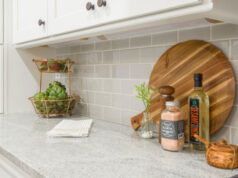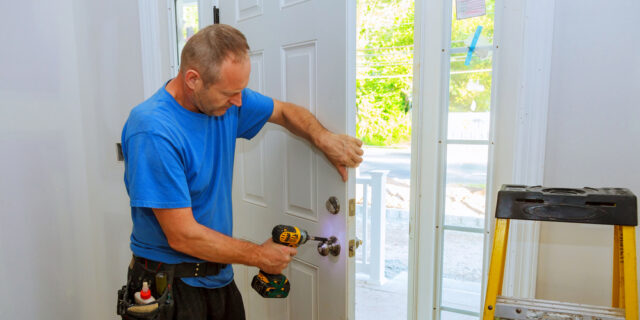
Home security is more than a mere precaution; it’s a necessary step in safeguarding our loved ones and belongings. In the realm of home defense, robust locks and sturdy doors are fundamental. They not only serve as the first line of defense against intrusions but also play a psychological role, deterring would-be burglars.
This comprehensive guide delves into various aspects of enhancing home security through effective use of locks and doors. From understanding the basics to adopting advanced safety measures, we cover everything you need to know to fortify your home effectively.
Types of Locks
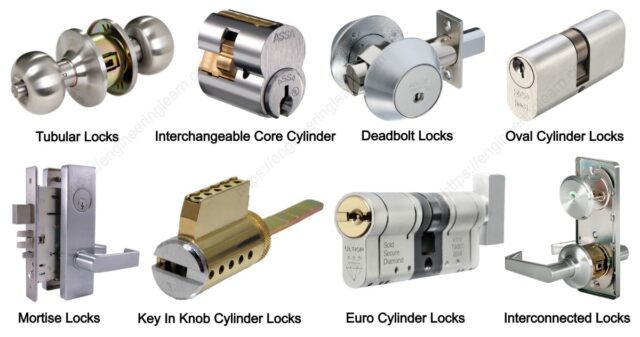
In the world of home security, the variety of locks available can be overwhelming. Deadbolts, knob locks, and smart locks are among the most common, each serving a unique purpose. Deadbolts, known for their robustness, are a popular choice for external doors. Knob locks, while common, are less secure and often used in combination with deadbolts for added security.
Smart locks represent the technological advancement in home security as every Beverly Hills locksmith would tell you, offering features such as remote access, user tracking, and integration with home automation systems. Understanding these types not only helps in making informed decisions but also ensures that you can tailor your safety setup according to your home’s specific needs and vulnerabilities.
Choosing the Right Lock
Choosing the right lock for your home extends beyond aesthetics and into the realm of security efficacy. The decision should be influenced by factors such as the lock’s security grade, your budget, and the specific needs of your home’s location. A higher-grade lock, such as a grade 1 deadbolt, is ideal for external doors in high-risk areas, offering maximum resistance against forceful entry techniques like drilling or picking.
For internal doors or homes in safer neighborhoods, a lower grade may suffice, balancing cost with a reasonable level of safety. It’s about finding the optimal mix of strength, functionality, and affordability.
Reinforcing Doors
While locks play a critical role in home security, their effectiveness is significantly enhanced by the strength of the doors they secure. Solid doors made from materials like robust wood or metal are preferable for their resistance to forced entry attempts. The integrity of a door is not just in its core material but also in its frame and hinges, which are critical points often exploited during break-ins.
Reinforcing these aspects can turn a regular door into a security asset. It’s not just about the lock; the door itself must be capable of withstanding various forms of breach attempts, thereby acting as a reliable and sturdy barrier that complements the lock’s safety features.
Deadbolt Installation
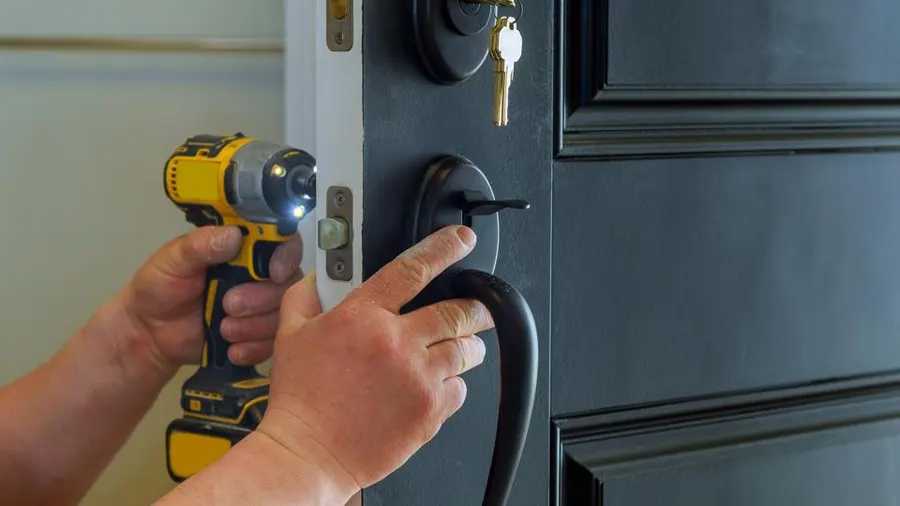
The installation of a deadbolt is a key step in enhancing your home’s security. This process involves more than just attaching a lock to a door; it requires precise measurement, drilling, and alignment to ensure the deadbolt functions effectively. The choice of deadbolt is crucial, as different doors require different types of deadbolts.
The installation process typically includes marking the door for the lock and strike plate, drilling the necessary holes, and fitting the lock securely. While DIY installation is possible, professional installation is often recommended to ensure optimal safety. A properly installed deadbolt can significantly increase a door’s resistance to force and picking.
Maintaining Locks
Maintaining your locks is as important as choosing and installing them. Regular maintenance ensures that locks function smoothly and remain effective over time. This includes simple tasks like lubricating the lock mechanism and checking for wear and tear.
It’s also important to inspect your locks after events that could compromise their integrity, such as attempted break-ins or severe weather conditions. Neglecting lock maintenance can lead to malfunctions, which could lock you out of your house or, worse, fail to keep intruders out.
Smart Lock Benefits
Smart locks are revolutionizing home security with their advanced features and convenience. Unlike traditional locks, smart locks offer remote access, allowing you to lock and unlock your doors from anywhere. This is particularly useful for situations like letting in guests when you’re not home or checking if you forgot to lock the door.
Many smart locks also provide access logs, showing you who has entered and exited your home and when. Integration with home automation systems and voice assistants further enhances the convenience and control you have over your home’s security. These features not only add a layer of convenience but also bolster the overall security of your home.
Smart Lock Security
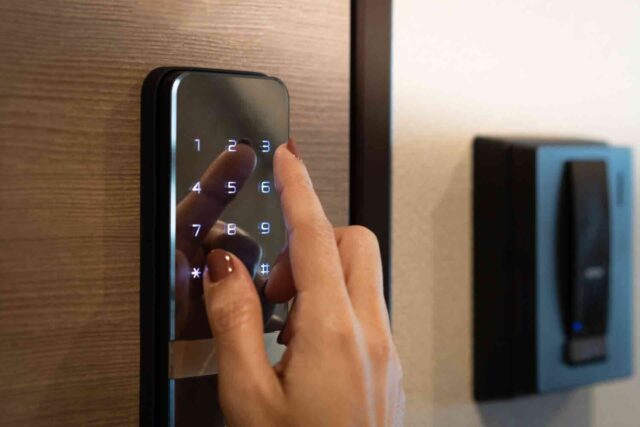
While smart locks offer convenience and advanced features, their security, especially against digital threats, is a crucial consideration. To safeguard against hacking, it’s essential to use strong, unique passwords for your smart lock apps and Wi-Fi networks.
Regularly updating your smart lock’s firmware is also important, as updates often include security patches. Be cautious about who you grant access to and monitor the access log frequently. Smart home security also involves securing your broader network, as other connected devices can be potential entry points for hackers.
Secondary Door Security
Securing secondary doors, such as sliding doors and patio doors, is often overlooked but is just as important as front door security. These doors can be vulnerable to break-ins if not properly secured. Adding additional locks, like foot locks or security bars, can significantly increase their resistance to forced entry.
For sliding doors, ensuring that the track is clean and the door fits snugly can prevent lifting or sliding. Frosted or reflective window films can also be used to prevent potential intruders from peering inside.
Security Accessories
In addition to robust locks and doors, security accessories play a pivotal role in enhancing your home’s defense. Items like door peepholes, security chains, and strike plate reinforcements offer added layers of protection. A door peephole allows you to see who is outside without opening the door, while a security chain provides a way to partially open the door safely.
These accessories are often simple to install and can significantly boost your door’s security. Incorporating these into your security setup can deter potential intruders and give you greater control over your home’s safety.
Neighborhood Watch
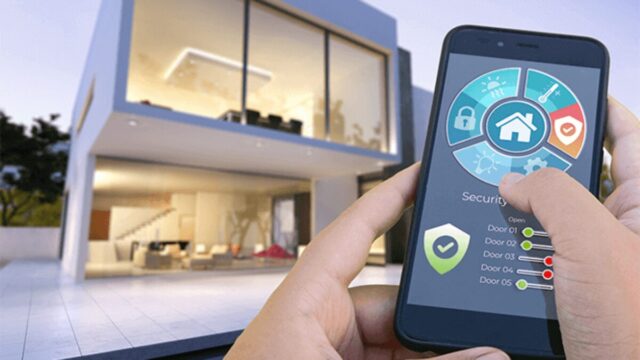
Community involvement plays a crucial role in enhancing neighborhood security. Participating in or forming a neighborhood watch program can significantly deter criminal activity. These programs foster a sense of community vigilance, where neighbors look out for each other and report suspicious activities to the authorities.
They also often involve collaboration with local law enforcement to provide crime prevention advice and support. By working together, communities can create a safer environment for all residents, reducing the risk of burglaries and strengthening the overall security of the neighborhood.
Conclusion
In conclusion, fortifying your home with robust locks and doors is a critical step in ensuring your safety and peace of mind. From choosing the right lock to reinforcing doors, installing smart locks, and participating in neighborhood watch programs, each aspect contributes to a comprehensive security strategy.



